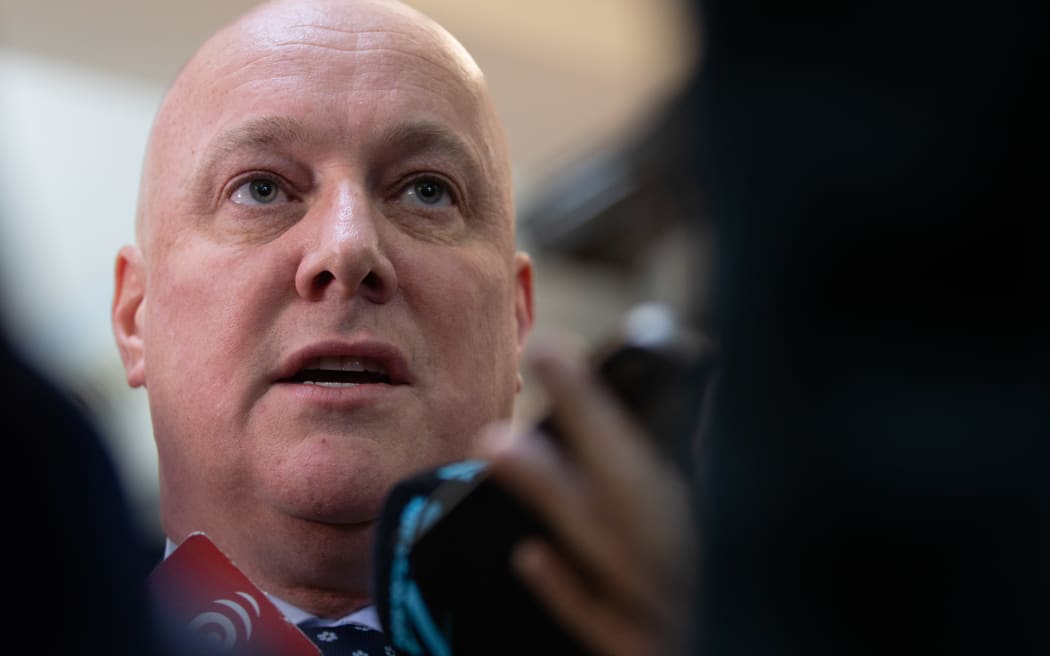
National Party leader Christopher Luxon said Labour is soft on crime. Photo: RNZ / Angus Dreaver
National would make membership of a gang an aggravating factor when it comes to sentencing, so gang members convicted of an offence face tougher consequences for their crimes, party leader Christopher Luxon announced today.
Luxon and National Party justice spokesperson Paul Goldsmith released the new policy at an event in Auckland today and said it will come into force if National is elected into government in October.
Luxon claimed New Zealand has seen a sharp increase in gang membership under Labour's government and retail crime has doubled overall, while violent crime also continues to rise.
"The big driver of that explosion in violent crime is due to gangs."
"The more we accept that the more it becomes a slow, slow decline," Luxon said.
The party has spoken out about the gang presence in the town of Ōpōtiki following the homicide and funeral of a prominent Mongrel Mob leader, although the town's mayor has accused politicians of using the death as a political football.
"Just last week we saw a town where gang members effectively came and took control of an entire town," Luxon said.
"I have to say that is not the New Zealand we want to see, that is not the New Zealand we want to accept."
In announcing National's plan to make gang membership an aggravating factor, he said it would be an initiative to "help restore law and order".
"Aggravating factors acknowledge that in some cases, the circumstances surrounding a crime may inflict greater harm upon their victims, and so warrant stronger sentences," Luxon said in a statement accompanying the announcement.
"National believes the visible presence of gangs in communities can lead to prolonged fear and intimidation for victims who have suffered at the hands of gang-related offences."
"By making gang membership an aggravating factor, judges will be required to consider this when determining a sentence," Luxon said.
"In practice, it means offenders who are known members of criminal gangs will likely face tougher sentences for crime.
"National's message is clear: If you choose to align yourself with a criminal gang and engage in criminal activities, you will face more severe consequences."
Luxon has previously announced National's other plans to crack down on gangs, which would include giving police powers to stop gang members gathering and wearing insignia in public, and to block their access to guns.
National gang policy a 'tweak in the margins' - Police Minister
Police minister Ginny Andersen has rubbished Luxon's announcement today.
Andersen said the law already substantially allowed for what Luxon was proposing.
Participating in an organised criminal group is already an aggravating factor if there is a connection between membership and the particular offence.
National wants gang membership to always be an aggravating factor when a gang member commits a crime.
Andersen called this a "tweak in the margins" that would have minimal impact.
"Today Christopher Luxon has embarrassed himself by making a gangs announcement that is already law.
"I think it's lazy, I think they've not done their homework, this was [National Party] policy in 2020 and it's being reannounced again today."
She said the courts have tools at their disposal to come down hard on criminal gang activity when they wished to.
Andersen said the Labour government has made a number of law changes to crack down on gangs, and was "going hard on gangs".
That includes new powers used for the first time in Ōpōtiki by police to arrest gang members, seize guns and search cars.
The legislation allows police to obtain an urgent warrant for a geographical area, instead of for individual people, if there were fears of gang conflict.
She said the arrival of 501 deportees has added complexity to criminal networks that has not been seen before.
Andersen said there would 700 police officers dedicated to fighting organised crime.





